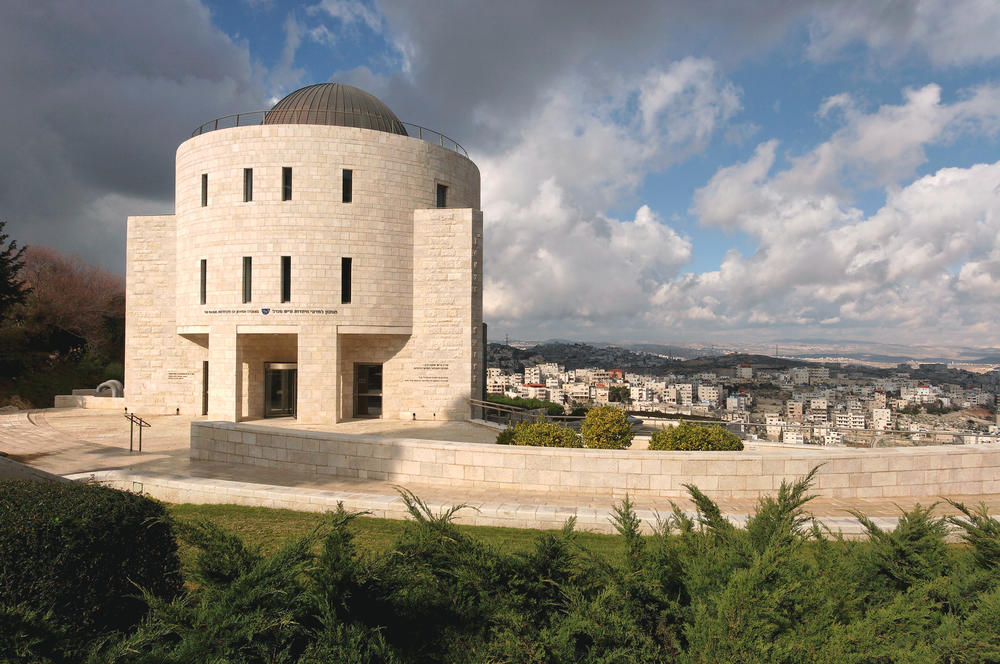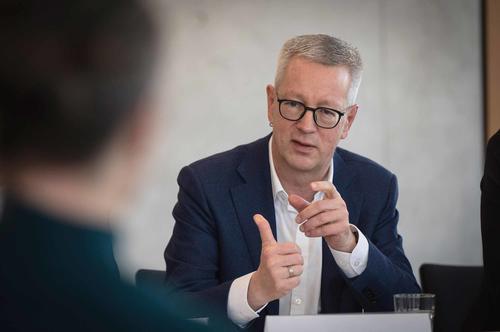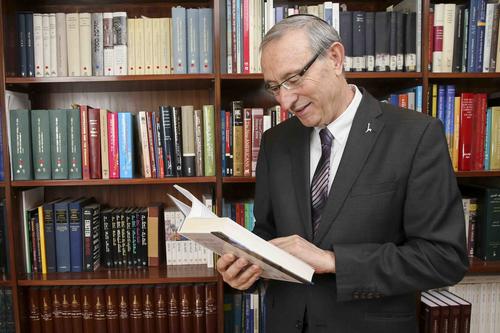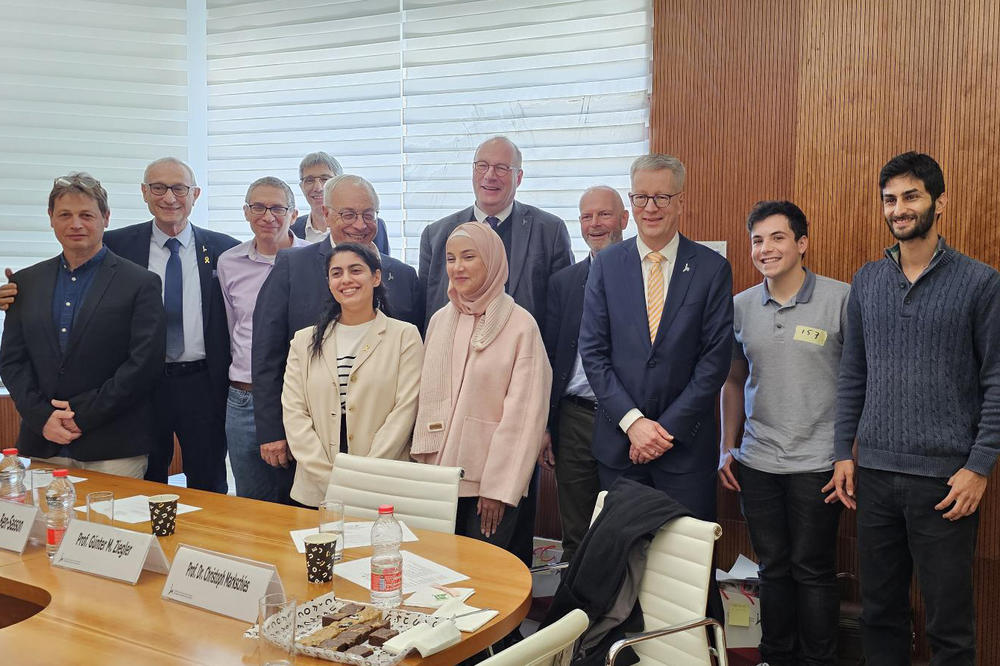“A Partnership Based on Trust”
An interview with Günter M. Ziegler, president of Freie Universität Berlin, and Menachem Ben-Sasson, former president of the Hebrew University of Jerusalem
Apr 10, 2024
The Hebrew University campus on Mount Scopus, Jerusalem. In the foreground: the Mandel Institute of Jewish Studies.
Image Credit: Picture-Alliance | Hanan Isachar
Freie Universität Berlin maintains close relations with many universities in Israel. Professor Günter M. Ziegler, president of Freie Universität, recently visited three of his university’s partner institutions in person as part of a multiple-day trip to Israel. The final stop on his journey was the Hebrew University in Jerusalem, an institution that Freie Universität Berlin has had connections with since 1957. A student exchange program was established between the two institutions in 1986, and a close strategic partnership was set up in 2011. In an interview, Professor Ziegler and Professor Menachem Ben-Sasson, who was president of the Hebrew University from 2009 to 2017, speak about the realities of university life in Israel in the face of the current conflict and the importance of collaborative ties between Germany and Israel.
Professor Ziegler, why was it important for you to travel to Israel at this time?
Freie Universität Berlin and its Israeli partner universities are connected by a long and unique history. I knew that it was extremely important to be there in person and show solidarity in these difficult times. I also have personal ties to Israel. I came here for the first time in 1976 when I was just thirteen and have returned many times since – both as a researcher and out of personal interest. My most recent visit to Israel was in early October of last year – just before the horrific attacks carried out by Hamas. As the president of Freie Universität, as a researcher, and as an individual, it was very important to me to return to Jerusalem.
Menachem Ben-Sasson, president of the Hebrew University of Jerusalem from 2009 to 2017.
Image Credit: Hebrew University of Jerusalem
Professor Ben-Sasson, how has life at the Hebrew University changed after the attacks of October 7, 2023?
Since October 7, Israel is not the same anymore. The attacks have changed all aspects of life. We are a country in pain. And of course, also university life has fundamentally changed. One third of our students have been drafted into military service. Within a week of the attacks, thousands of our students had left the university. Until today, many of them are deployed in the north, in the West Bank as well as in Gaza. Under these circumstances, we could not begin the school year normally. However, with the immense effort of the faculty and the students, we managed to start the semester in December.
President of Freie Universität Günter M. Ziegler and President of the Berlin-Brandenburg Academy of Sciences and Humanities Christoph Markschies were warmly received at the Hebrew University in March 2024.
Image Credit: Danna Philosoph-Hovav HUJI
How did the students manage to deal with the difficult situation?
We are an international and multireligious university. We have all kind of students – Israeli and Palestinian, Jews, Muslims, Christians, and other religions. And of course, many students from all over the world. Fortunately, our students have a strong sense of community that is proactively fostered by our student ambassadors. These are young people from all kind of backgrounds. After the attacks, they helped to establish platforms where our students could come together and discuss.
We do not ask our students not to protest. We encourage them to be politically involved. However, they need to find a common language. On our campus, Palestinians from East Jerusalem meet young Israelis who may have fought as soldiers in Gaza. Every morning, when they come to university, they have to give up a bit of their own identities and ideas and start to build bridges. It is impressive to see how they talk to each other, how tolerant they are. On our campus, we have never experienced a divide between our Jewish and Arab students.
Professor Ziegler, what are your thoughts about the atmosphere on campus?
The student ambassadors have a special role at the Hebrew University as facilitators of dialogue between various groups of students. I was able to meet some of these ambassadors personally in a group discussion and learn about their different backgrounds. It was very impressive to see how they manage to operate on equal terms and without resentment, despite their differences. I was very moved by this, especially when you compare this reaction to some of the conflicts that arose on the campus of Freie Universität. I am inspired by the students’ readiness to reach a common understanding, even under extremely difficult conditions.
In the upcoming summer semester, I will be in very close contact with the other members of Freie Universität’s Executive Board. We are going to work together to introduce more measures that promote peaceful and respectful communication on campus. We are also already in talks with the Hebrew University to see if it would be possible to develop joint projects on this topic.
Freie Universität Berlin and the Hebrew University share a long history. What does this partnership mean to you?
Günter M. Ziegler: The first contact between Freie Universität and the Hebrew University arose in 1957 when students from Freie Universität wrote to the president of the Hebrew University to pave the way for a student exchange between the two institutions. These plans came to fruition in 1963, when the first Freie Universität students arrived in Israel. Both universities were already working together long before Germany and Israel officially took up diplomatic relations in 1965. Since then, both universities have developed a long-lasting strategic partnership that has grown to encompass a range of exchange programs as well as a joint doctoral program. It is a partnership based on trust, and one that has stood the test of time. This is something that I felt time and time again during my visit, and it is something that I am very grateful for.
Menachem Ben-Sasson: For us, Germany is the closest academic neighbor that we have, and one of our most important academic partners. The solidarity that we received from German universities and notably Freie Universität was unprecedented. The understanding that grows through academic cooperation is immensely important. Our students are lining up to participate in our partner programs with Freie Universität. They are eager to learn the German language and culture. And of course, we are very happy to welcome students from Freie Universität and other German universities on our campus. For many, many people in both countries, our programs have led to lifelong lasting connections and friendships.
How do you see this partnership developing further in the future?
Günter M. Ziegler: One big upcoming project is the creation of two endowed professorships that will further promote close collaboration between Freie Universität and the Hebrew University. It is my goal to give Israel studies a permanent home at Freie Universität. Research and teaching on the history and politics of Israel are of particular importance in Germany and Berlin, but a dedicated professorship has yet to be established at a German university for these topics. The professorship based at the Hebrew University shall aim to put the focus on human rights and antisemitism.
Dennis Yücel conducted the interview.
The original German version of this article appeared in campus.leben, the online magazine published by Freie Universität Berlin.




